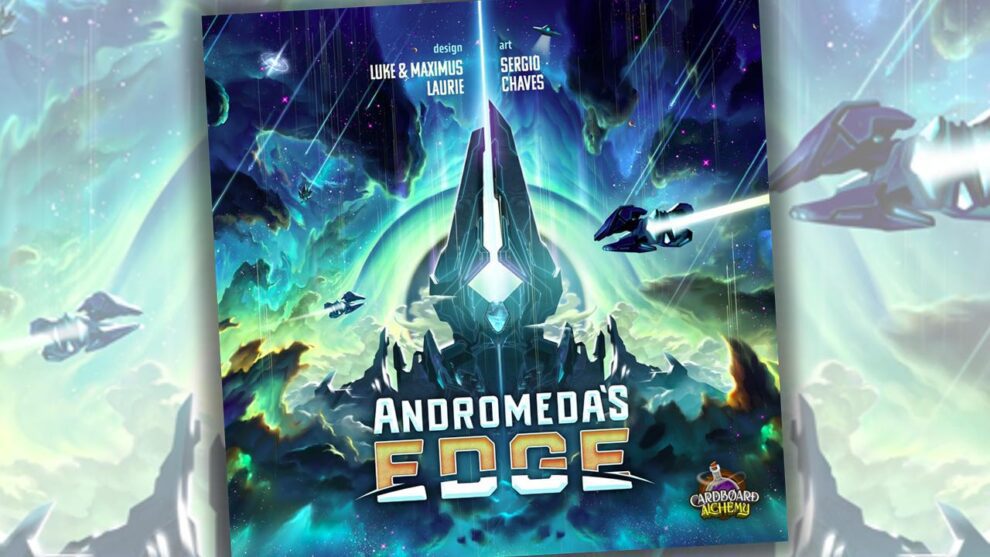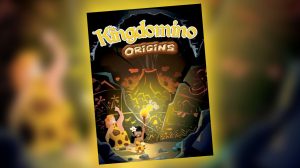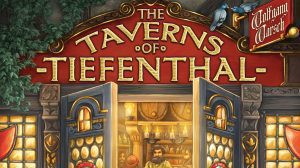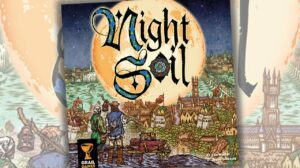Disclosure: Meeple Mountain received a free copy of this product in exchange for an honest, unbiased review. This review is not intended to be an endorsement.
The best board game I played in 2021 was Dwellings of Eldervale (2020, Breaking Games). It did everything I wanted in a board game—lots of combat, a fantasy setting, Euro-like engine building elements, player powers and cards that all felt a little “broken”, cool miniatures, and Game Trayz. I played it four times that year and was sure it was one of the best games ever made, at least in terms of my play preferences.
Dwellings of Eldervale has the kind of randomness that is fun because the stakes were often quite low. Even when players lose in combat, they seem to always get something useful, and getting damaged units back was as easy as taking a recall action. Sure, that recall action is better when your units are healthy when they return to your play area, but over the course of a three-hour game, everyone took their licks from time to time.
At PAX Unplugged two years ago, I had the chance to demo Andromeda’s Edge, the updated version of Dwellings that changed the setting to space and made mostly minor changes to a variety of the original game’s design elements. Like Dwellings, Andromeda’s Edge is designed by Luke Laurie (adding Maximus Laurie as a co-designer this time around) and Andromeda’s Edge continues to utilize my favorite part of another Laurie design, Cryo. Recalling your ships triggers a river of resources, points, upgrades, ships, and/or other goodies that make rejoining the fight such a blast.
I loved Dwellings, so it will come as no surprise that I love Andromeda’s Edge. It addresses the one thing that I think people hated most about the first game regarding combat, while adding an event deck that proves to be a minor chore to manage but provides interesting ways to change the game state between rounds.
The main takeaway from my three review plays and talking to other friends who have played both games? You don’t need to have both Dwellings of Eldervale and Andromeda’s Edge in your collection because the games are so similar. Andromeda’s Edge also makes one crucial mistake in terms of its production, especially if you love the phrase “monster base sound effects.”
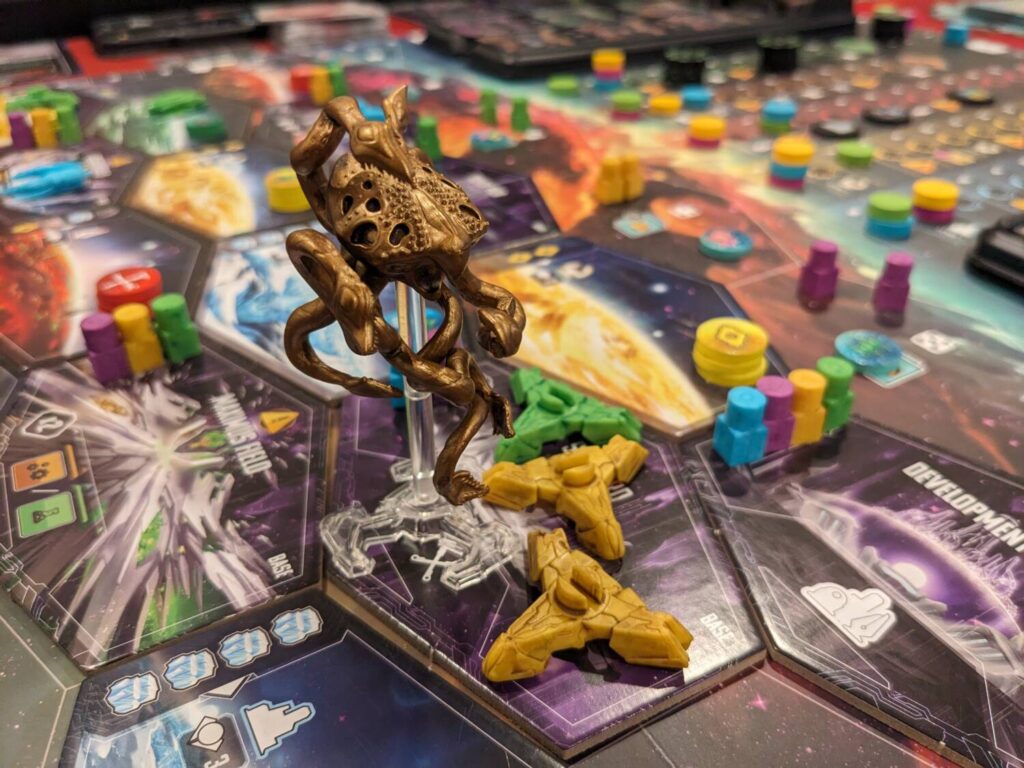
Could You Pass the Tray Full of Miniatures? No, The Other One
Andromeda’s Edge is a 1-5 player worker placement game with elements of hand management and area majority scoring that plays in about 40 minutes per player, just like it says on the side of the box.
Players manage a faction of leaders and ships (made up of transports, fighters, cruisers and science vessels that look suspiciously like the USS Enterprise from Star Trek) that must explore the game’s map to build developments, claim moons that turn into tokens that help power a player’s personal engine, and fight opponents that include other players and “raiders”, random factions represented by large golden-colored miniatures that spawn on the map.
Cardboard Alchemy sent a review copy of the “All In” deluxe version of Andromeda’s Edge, and I will pause here to say that this version of the game is gloriously ridiculous. Like, Voidfall-level ridiculous. (It’s probably more accurate to say that this version of Andromeda’s Edge is Dwellings of Eldervale-level ridiculous, since the source material is one of the first big-box all-in crowdfunding games I played during COVID.) There was so much stuff in the Andromeda’s Edge box that I literally weighed the box to see how much stuff was in there. (17 pounds!!!)
On a turn, so much takes place during Andromeda’s Edge that the game’s rulebook is split into two separate documents in the game’s BGG “Files” area. Here’s a short version—players launch ships from their player board onto the game’s map, take actions if they land on a base or claim a moon token (or a resource) if they fly to a planet, then go through a combat round if a raider is nearby or another player has units on the same space. In between all of this, players can use one or more of their Tactics cards to trigger a host of other actions as well.
The main action that players need to commit to at some point is the development action. In Dwellings, that meant turning one of your workers into a dwelling, scoring points based on the number of player buildings and “Ruins” adjacent to your new Dwelling. (In a helpful twist, the game was called Dwellings of Eldervale and the chief way to score points was to build dwellings. Bingo, got it–the game’s title is also the way to win!)
In Andromeda’s Edge, players must turn one of their transports into a development in one of five types based on the color of the planet, scoring points for every leader token in the active planet and surrounding areas.
In my plays of both Dwellings of Eldervale and Andromeda’s Edge, the player that won usually built the most dwellings or developed the most buildings. You’ll score up to 10 points in Andromeda’s Edge when you build a development, and you will also score end-game points for each development based on the tracks laid out in the center of the board. While players can neglect certain parts of the game’s processes, development feels like one that you can’t miss out on to achieve victory.
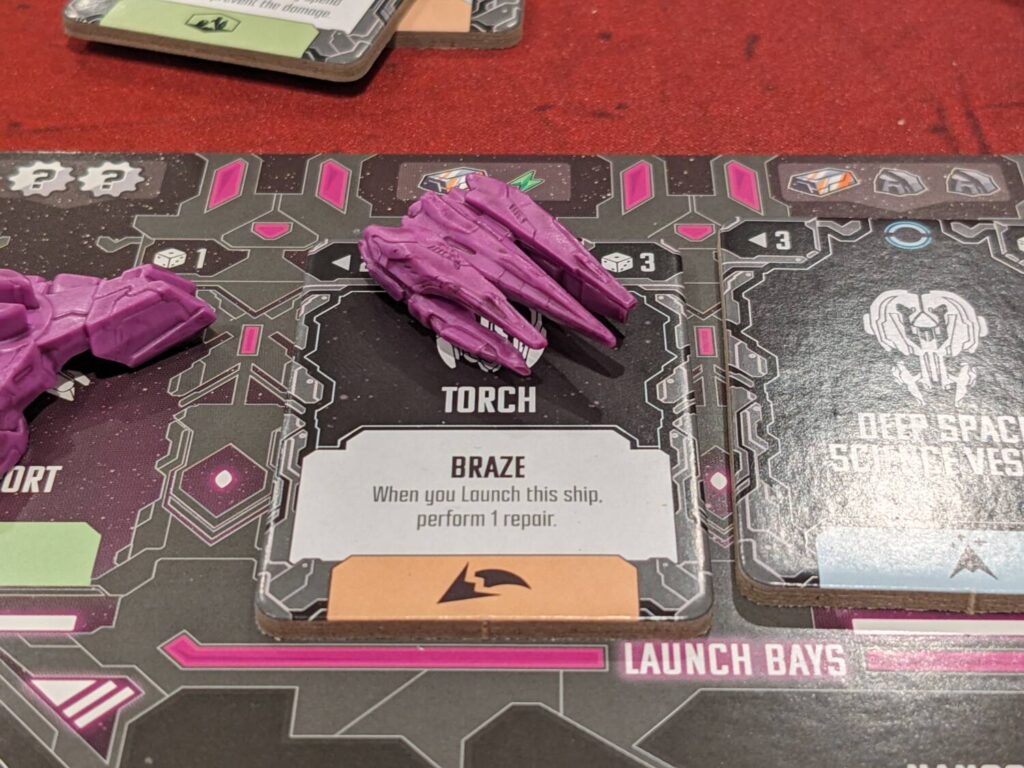
Targeting: Locked On
“How much combat is there in this game?” one player asked before committing to a review play.
“Uh…a lot. In some rounds, it will happen on almost every turn. But good news: if you lose a combat, you get a reward, and sometimes the reward is the goal of the combat.”
Combat is a way of life in both Dwellings and Andromeda’s Edge. The combat format—which I love in both games—is very simple. Players roll as many normal six-sided dice as their ships, powers, and extra benefits allow, up to six dice. However, the single highest die result wins. Ties are broken by the second die result…so if two players roll a six, but the next highest die result for one player is a four and the other player is a two, the four wins.
Yes, that means that if one player rolls a single die and rolls a five, but you roll four dice and don’t roll anything higher than a three, the player with the five wins. That also means that from time to time, the badly overmatched opponent will win…in a combat featuring lots of other players. The number of times I won (and lost) a combat that way in Dwellings was comical…but that was the beauty of making sure every player had a chance to be in the mix, every time.
Andromeda’s Edge adds one crucial element to the combat that made everyone happy: targeting. Now, players roll their six-sided dice, but based on their targeting value—a mix of the number of ships a player has in a combat, plus ship powers and maybe card effects—players get to re-roll dice results that come in lower than their targeting value. In a fight where a player’s targeting value is four, a player gets to roll their allotted dice until all dice show at least a value of four.
YESSSSSSSSSSSSSSSS!!!!!
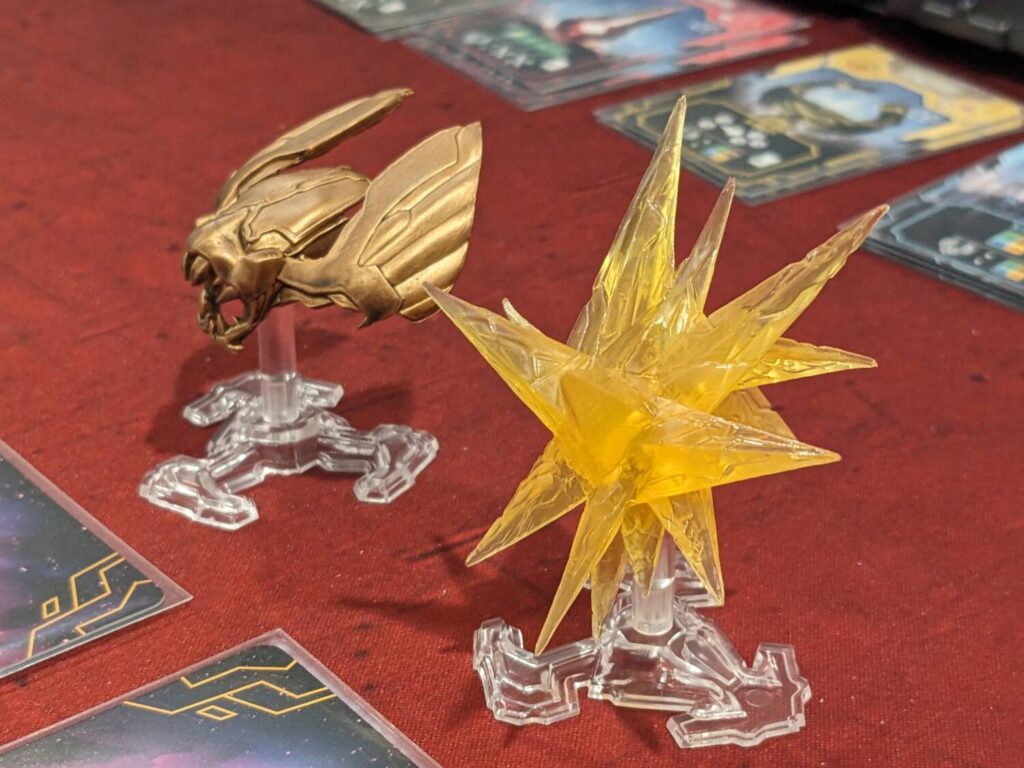
That means combat still offers randomness, but that randomness can be mitigated in so many different ways. Targeting maxes out at five, so a player that rolls a six might still beat a player who just rolled a bunch of fives. But even then, the player who ended up with all those fives probably had a chance or two to reroll lower numbers first before the results ended with a five, and it was just unlucky for them this time around.
And remember—while winners move up a track dedicated to combat victories, every other player gets either a Tactics card or another benefit, depending on whether they have slotted a moon token in that portion of their player mat.
Sometimes, the player that won the fewest battles in a game of Andromeda’s Edge was also the player who built the most developments and still won the game. (This happened to me in my third review play; I won only one battle the entire game, and still won by 40 points.) It’s nice to win a combat from time to time, but it’s not game-breaking if you don’t. It’s also great to know that even if your dice rolls aren’t coming up aces, you are still very much in the game.
Combat is such a blast in Andromeda’s Edge because the entire process is so dynamic. Players who have a development adjacent to the active combat area get to roll dice, Tactics cards can be used during the fight (Diplomacy) to alter the combat state before things even begin, and the raiders often make formidable opponents. Any time I could get in on a combat, I did so with my non-transport units…because the cards are so juicy. (I kept my transports on planets so that I could later turn them into developments for the reasons stated above.)
Speaking of those cards…
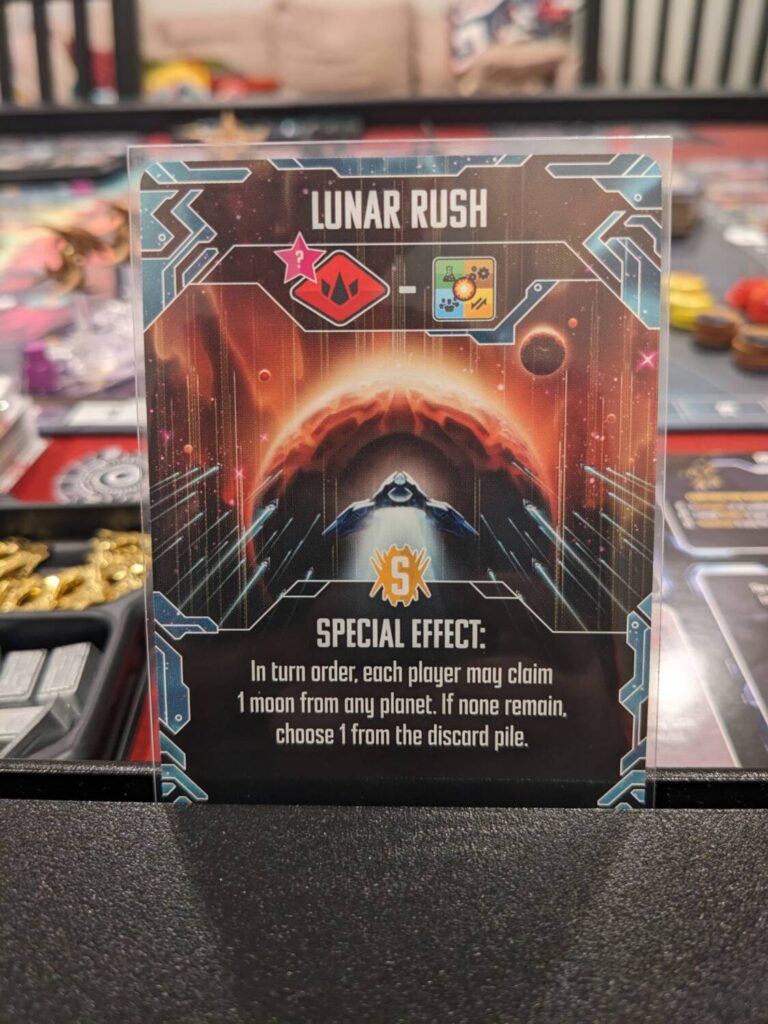
“It Feels Like Everyone’s Cards are Broken”
Every unique player who joined me for plays of Andromeda’s Edge said the above quote at some point during one of my plays and I agree, because I love it.
The Tactics cards in Andromeda’s Edge are the best resource in the game. The cards do wild things, like add dice to a combat that an opponent thought they just won, or grant resources while damaging other modules on a player’s mat. Tactics cards can be spent to build ships, acquire modules, add targeting to your ships for the rest of your turns before taking a recall action, or more depending on the power of your faction.
One of my favorite parts of the design is tied to the tracks…and one of the tracks, Civilization, is tied to increasing card hand size from five to six to even seven cards. But each time you hit a new hand limit threshold milestone on the track, you get to refill your entire hand of cards to its new limit for free.
Upgrading ships on the Industry track is just as cool, because then players can upgrade the powers of each ship type then get a free ship if they have an unbuilt ship of that type. The ship powers are cool, too. Each player gets a set of four “basic” ship upgrades, plus one for their player faction. I loved the ship upgrade for transports that gave them more dice for combat…that way, I didn’t need a fighter, and I could use my transports for more than just turning them into developments later on.
Almost everything about Andromeda’s Edge makes a player feel like a boss. “My ships are so cool,” a player might say. “But not as cool as my faction abilities,” another might respond. Then someone would whip out a card that gave them a free D6 die to roll in their next combat, before another played a card that added a rolled six to their combat results.
It’s all so juicy!
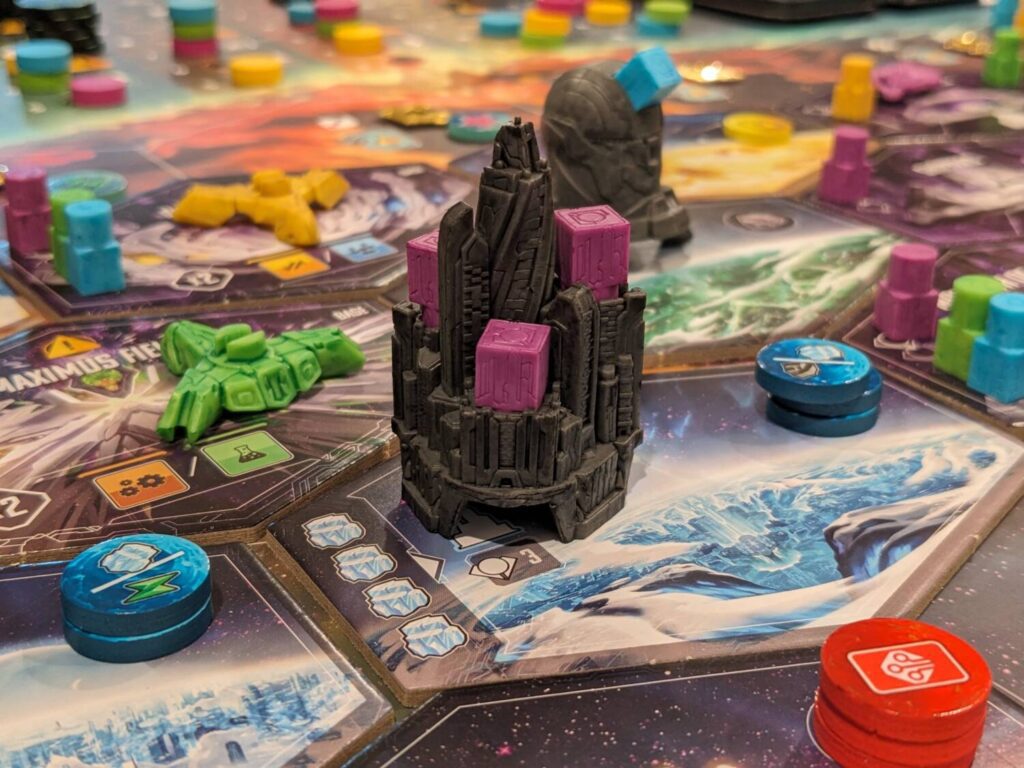
OK, Nothing’s Perfect, Right?
Here’s what didn’t work for me with Andromeda’s Edge.
I still can’t believe that the raider miniatures don’t feature sound effects. The miniature bases used to prop up the minis in Dwellings of Eldervale made funny noises based on the monsters that were slotted into each stand. That’s gone now in Andromeda’s Edge. That probably brought the production costs down. Still, have you ever heard anyone besides me complain about the cost of these ever-increasing $200, $300, $400 games? If you’re in, you’re happy to spend ten or twenty extra dollars to own miniatures that make noises.
The raiders here needed silly sound effects emitting from their bases, and I will accept no substitute!
Second, the artwork on the raider cards is strangely hard to match to each mini. The All In version of the game shows you where each mini should be returned in the storage solution, but I shouldn’t need that when I’m looking at the picture of the Ice Pirates…I should just be able to look at the mini and tell which one is which. A few players called this out as well, so I don’t think I’m the only one experiencing this problem. (That said, the minis are DOPE.)
The third issue is the only thing that scares me about Andromeda’s Edge: the set up time.
Despite another excellent effort from Game Trayz aiding with set up, the sheer number of things that are randomized and have to be set up separately are borderline obscene. It took me 40+ minutes each time I set this game up. That will certainly come down by play 10, but my early plays involved set up and tear down each time I brought out the game. (I don’t have a table that sits out all week waiting to be played on, unfortunately.)
That puts Andromeda’s Edge in a tricky place. Like Voidfall, I struggled to get Andromeda’s Edge out on one occasion because I didn’t think I would have enough time to go to my day job, get home, get my kids prepped for practice/dinner/baths/etc., then set up Andromeda’s Edge for four players.
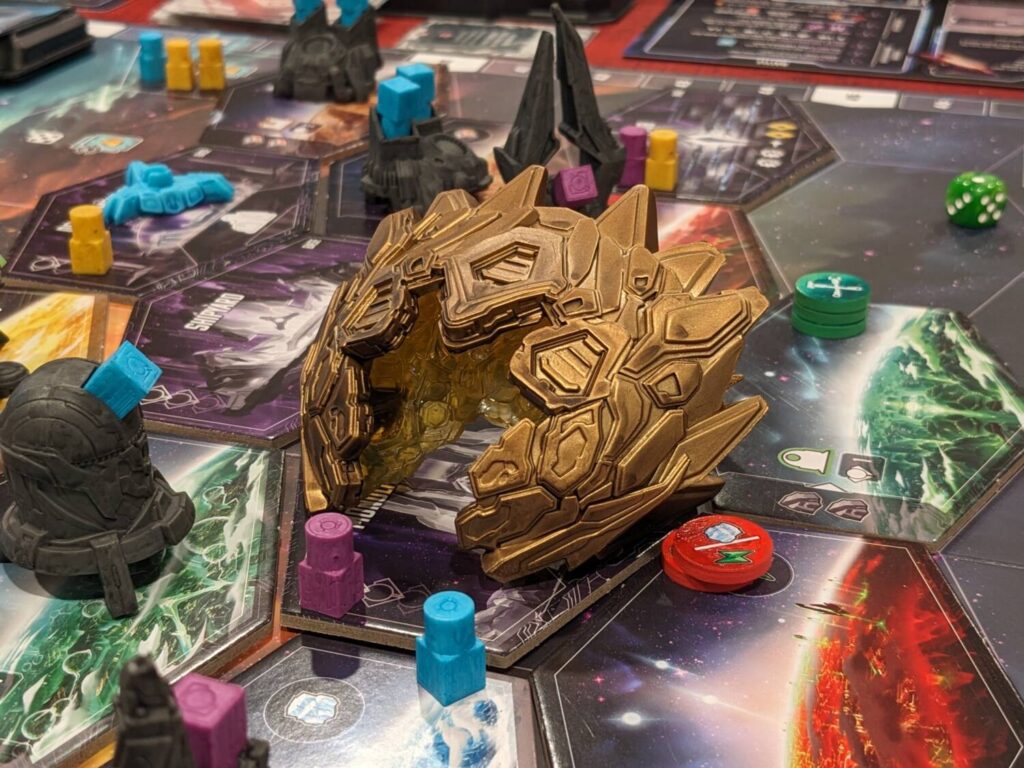
It’s a lot. One player, after finishing a four-player game, looked at the mess on our table and joked: “I’m glad I’m not the one who has to clean all that _____ up!” I shot down a five-player game on one occasion because I couldn’t fit all the stuff for a five-player game on my table.
The fourth issue is going to depend on your playstyle. Like Dwellings of Eldervale, I think Andromeda’s Edge is a four- or five-player game. For this review, I played Andromeda’s Edge twice at four players and once solo, using the AI to play a two-player game. The solo mechanics are great, easy to manage, and the solo offers nine levels of play based on the commander (AI) you want to fight. As a process, the solo mode was pretty good.
The problem with solo is that Andromeda’s Edge doesn’t work as well in a mostly empty galaxy. I love the game state with a lot of players. With two players, I found combat to be less interesting and much more driven by interaction with raiders, some of which are really tough.
It’s also a bit too easy to count on which spaces will not be occupied by the time your turn comes around. Events happened more frequently in my solo game, especially because I had turns where I might move the event counter up 2-3 times on a single turn. Because the event counter starts closer to the trigger spot in a solo game, I was always having to deal with more raiders.
The best about the solo mode—it can be integrated into a two-human or even a three-human game as an additional opponent. In a two-player game, I would definitely recommend adding the bot. It will just make the whole thing feel closer to a crowded game state.
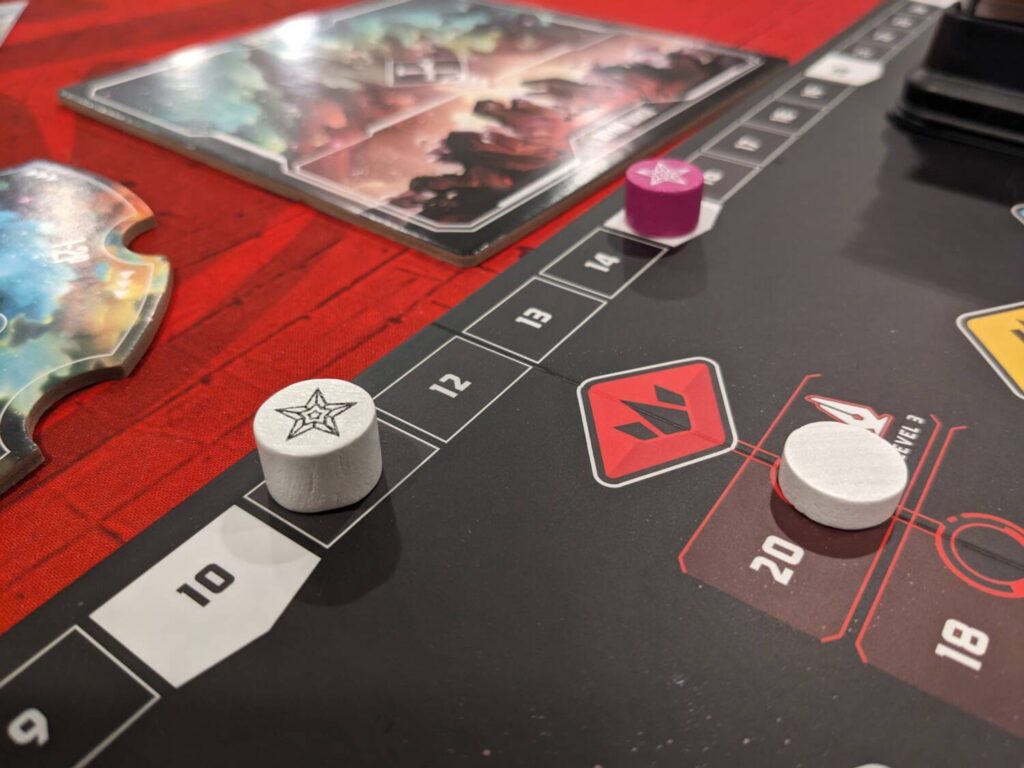
Do You Already Own Dwellings?
As fantastic as Andromeda’s Edge is, I would not recommend buying Andromeda’s Edge if you already own Dwellings of Eldervale.
The gameplay is very similar, to the point where I found Andromeda’s Edge easier for me as I remembered what strategies were so effective in Dwellings. The edges are certainly fine-tuned in Andromeda’s Edge, but it’s not like Dwellings was so rough that I would never play it. (Remember, I thought it was the best game I played in 2021.) Unless you have a major passion for a sci-fi theme, you already have a great game in Dwellings that probably needs to hit the table more often anyway!
If you don’t already own Dwellings, I highly recommend picking up Andromeda’s Edge if you like a mix of a good Euro and a good dice-driven space combat game. I am told (but have not seen for myself in person) that the retail version of Andromeda’s Edge is still great, so if you can save some money and don’t mind a game that just looks good, but not ridiculously good, the standard version of the game will do the trick.
The price for the deluxe edition is hefty, but the production is so strong and there is so much setup variability in the box (thanks for a few included mini-expansions) that the value proposition here is quite strong. Also, the Escalation expansion included with the deluxe edition is the only way to play solo or with five players, so if you really want to try the solo, you’re going to have to pony up the cash.
Between the set up time and the teach plus playtime with new players, Andromeda’s Edge is dangerously close to falling out of range for a weeknight game, which is important for me because most of my game nights take place during the week (ideally between 7-11 PM). Depending on your personal situation, there are easy ways to get around that, particularly with setting up this game the night before it is played.
Otherwise, I will play Andromeda’s Edge—or Dwellings of Eldervale!—any chance I get, especially if you are the one hosting game night. I can’t wait to break this out again soon!


